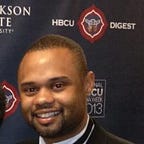Time to Get Rich — Reevaluating the HBCU Model of Career Preparation
Georgetown University’s Center on Education and the Workforce has released its latest report “African Americans: College Majors and Earnings,” a revealing snapshot of the degrees black graduates earn and the earning potential tied to them.
According to the report, black folks overwhelmingly earn degrees in disciplines offering low earning potential and narrow career mobility. Industries like secondary education, health and human services, criminal justice and religious studies attract between 13 and 21 percent of all black graduates with at least a bachelor’s degree, but earn their recipients $41,000 or less in annual median salary.
Researchers say this leads to a deficit in economic stabilization for families, and creates negative long-term effects on generational wealth building. From the report:
“African Americans who choose majors in well-paying, growing fields are likely to be better positioned to get higher paying jobs, acquire less student debt and nurture future generations. This is especially important to a demographic group that historically has been deprived of opportunities and had fewer economic assets and resources making them especially vulnerable to the family stress created by economic ups and downs. Fewer African Americans in high-paying jobs can translate to fewer positive role models of how to be financially successful for younger generations and fewer opportunities to contribute economically to their family and community. Careful career planning is especially crucial for African American students to help them avoid debt and underemployment later in life.”
There are some gaps in the summary and in the report at large. First, it does not offer a comparison to the percentage of white students who choose to work in low-earning industries. Second, it offers the assumption that work in a low-wage industry automatically disqualifies someone from being financially successful — as if black college grads do not get married and live in two-income households, do not live below their means, or only work one job.
Third, median income does not account for mobility in low-earning industries which trend towards low entry-level wages, but competitive salaries with years of service or additional earned education. The earnings of a first-year teacher or case worker aren’t comparable to those of a principal or director of family services for a state agency, but they all classify within the same poor, righteous industries.
And finally, the report offers no insight into the disparities, and pressure to eliminate them, faced by African-Americans in the areas specifically served by low-earning industries. Black folks nationwide face crises in secondary education, public and mental health, criminal justice and social work, and black professionals are dramatically underrepresented in some of these areas. Could it be that as more black folks enter and graduate from college, they are driven to work in industries where their presence and intellect is needed most among their own people, even if they can’t afford to ball like its March Madness on the weekend?
But the report also highlights some harsh, unspoken realities about HBCU academic offerings, and historically black pedagogy and outcomes. HBCUs today maintain much of the spirit of their original founding purpose — to train black folks to work in industries that white benefactors and legislators deemed fit for integration more than 150 years ago. HBCUs have outlived the societal mandate for separatism and have outlasted the consequences of integration; but they have not adjusted to the nation’s several industrial revolutions which now almost demand ownership and cross-disciplinary expertise.
Up until the last 20 years, government and white philanthropic culture did not target HBCUs for investment in the applied sciences. But now that the nation desperately needs scientists, engineers and mathematicians to meet domestic objectives for homeland security, innovation and commerce, the country is paying well for great minds wherever they can be found — Negro or otherwise.
The same is not true for secondary education and social work, industries which don’t make the nation richer or safer in short term objectives, but incrementally stem the effects of poverty and racism one generation at a time. HBCUs like Southern University and Winston-Salem State University are recent examples of how to strategically plan through academic realignment and calibration for industrial and social needs. Saving lives and improving communities aren’t cash generators, but with the right pairing of government, private sector, research and workforce development, everybody can get paid while conditions improve for the underserved.
In whatever industries HBCUs train our graduates, the new economic imperative demands that we prepare and expect ownership as the ultimate outcome. We can no longer follow the HBCU model of preparing students for entrance into a diverse world; our focus must become preparing students to lead within Black America. If our programs of strength are education, social work and criminal justice, then we must train students to create charter schools, non-profit outreach centers and rehabilitative agencies to contract with federal and state prisons. S.T.E.M. graduates should be encouraged to establish their own research parks and firms, and journalists to establish their own media companies.
The American dream is not to work in an booming industry, but to create one. And black students have every right to own a piece of that dream, and to work so that their communities also can reap the benefits of their productivity.
Each student has a responsibility to choose a career path which fulfills their dreams and drives them to inspire the world around them. It’s up to government and the private sector to find ways to support colleges of all sizes and missions, in order to create an ecosystem of productivity and opportunity which includes all kinds of people. But its up to HBCUs to re-imagine their role in developing students and convincing government and private sectors to see them as an ally in all needs — immediate and future.
